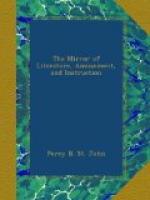“Withdraw
yourself
Unto this neighbouring grove; there shall
you see
How the sweet treble of the chirping birds,
And the sweet stirring of the moved leaves,
Running delightful descant to the sound
Of the base murmuring of the bubbling
brook,
Becomes a concert of good instruments,
While twenty babbling echoes round about,
Out of the stony concave of their mouths,
Restore the vanish’d music of each
close,
And fill your ears full with redoubled
pleasure."[4]
such as warmed Spenser when he wrote his “Bowre of Blesse;” Tasso his “Gardens of Armida;” Collins his “Melancholy,” who
“Pour’d through the mellow horn her pensive soul”—
such hearts, I say, and such as have drunk with unsatiated thirst at the fountains of these “masters of the lay,” are better qualified to speak upon a question of the “concord of sweet sounds” than all the merely scientific musicians, whether professors or amateurs, in the world.
[4] “Lingua.” Dodsley’s Old Plays.
“Of melody aye held in thrall,” I profess myself an admirer of that English music which preceded the appearance of Mr. Braham—the music of Arne, Jackson, Carter, Storace, Linley, Shield, Davy, even of Dibdin, and of those fine airs, (the names of whose composers are now little better than traditional), which glow in the Beggar’s Opera. And of this music there never was heard a singer equal to Incledon, and perhaps never will. The pathos, the richness, the roundness, the satisfying fulness to the ear, which characterize these composers, can never be mastered by the merely scientific singer; they composed for the voice, and without that organ in its most perfect state, complete justice can never be done to their strains.
I before said these masters flourished previous to the debut of Mr. Braham; for it is in a great measure owing to that gentleman, and the false taste he introduced and has kept alive, that they are now so seldom heard in our theatres, concerts, or drawing-rooms. We have lost the notes of melody and feeling, and what have we in their stead? The glitter and plagiarism of Rossini, the ponderous science of Weber, and the absolute trash of all our English composers. The last mentioned gentlemen certainly came into court “in forma pauperis,”—satisfied with the merit of arrangers, harmonizers, &c., and are found to confess, when detection is probable, that the very soul of their pieces—the melody[5]—is taken from such an Italian, such a Sicilian, Greek, nay even Russian air.
[5] “Melody is the essence
of Music,” said Mozart to Michael
Kelly; “I compare a
good melodist to a fine racer, and
counter-points to hack
post-horses.”




